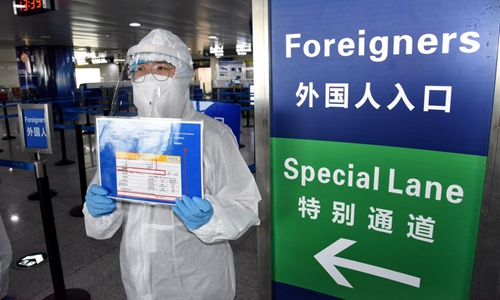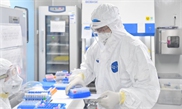Guangzhou launches health QR code in 5 languages, over 23,000 foreigners register: official

A staff member reminds foreigners to fill in an arrival card at Qingdao Liuting International Airport in Qingdao, East China's Shandong Province on March 5. Photo: Xinhua
Over 23,000 foreigners in South China's Guangzhou have registered with a government-initiated health QR code system, which can be used as health status certificate and a pass, the local government said on Thursday.
Yue Xiangyang, an official from the Guangzhou government who introduced the QR Code system, or "Suikangma," at a press briefing, said it not only serves local Chinese residents, but also has versions in five languages, including Chinese, English, French, Japanese and Korean. More than 34,100 foreigners in Guangzhou have applied to use the QR Code.
The Suikangma QR code is widely used in Guangzhou to allow residents to declare their health condition amid the COVID-19 epidemic.
To strengthen information security and privacy protection, the code system has established a real-name authentication mechanism for foreigners.
Users are required to fill in their information including phone number, personal ID, travel history and health status. They will then receive a QR code that is valid for seven days to prove they are healthy. Residents need to enter their information once again after seven days to get an updated code.
When a code owner reports symptoms through the code system, communities and local health authorities will receive the information and carry out timely and thorough treatment, said the government.
Yue said that foreigners have the same rights and opportunities to use Guangzhou's health code, and the use of Suikangma shows that there is no discrimination against foreigners during the coronavirus prevention and control work.
Xia Haihui, an official from Guangzhou's health authority, said on Thursday that the city regulators are encouraging foreigners to go to designated hospitals for nucleic acid testing, especially those who traveled abroad before and after the outbreak, and those who may have had contact with confirmed or suspected COVID-19 cases, or those who are showing symptoms.
There were a total of 39 confirmed cases of foreign patients and 102 foreign asymptomatic patients in Guangzhou as of Thursday, said the official.
Global Times

